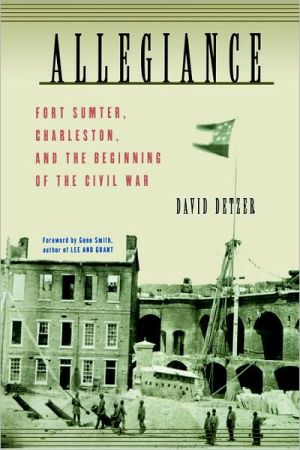

 |

|

The average rating for Allegiance: Fort Sumter, Charleston, and the Beginning of the Civil War based on 2 reviews is 4.5 stars.
Review # 1 was written on 2020-06-17 00:00:00 Martin Antonio Gomez Gonzalez Martin Antonio Gomez GonzalezAn incisive look at the days between secession and the actual firing on Fort Sumter. Books about the Civil War don't gloss over these few months per se, but usually after the declaration of a Confederate States of America, the larger scope of those books tend to relegate Fort Sumter to a few paragraphs or few pages. Makes sense: gotta get to the big battles. Detzer skillfully builds up the tension between the actual break from the Union through the decision to fire on Fort Sumter. It wasn't random; in fact, Lincoln seems to know that the war will inevitably erupt there and is determined that the South fire first! Never knew that. The actual bombardment and the actions of the people inside are more fully fleshed out than typically, and it is genuinely terrifying. The politics and vitriol of Charlestown to the "yankees" in their midst are also examined. A breezy read (of 300+ pages) for those who want to see the precise actions that tipped America into Civil War. |
Review # 2 was written on 2017-09-20 00:00:00 Christine Nelson Christine NelsonMost history books are read for facts and/or interpretation. They are almost never page turners. That is not the case here. Detzer describes the machinations, miscalculations, and maneuvers in detail and without pointing to the inevitable ending; when the Star of the West approached I was actually gripped with fear that a war could start. He is also good at making the major players real people, particularly Robert Anderson, the tragic hero of the story, a man who does not want war, even sympathizes with the South, but will not surrender the fort. His portrayal of James Buchanan is more empathetic than most, coming right before the current round of Buchanan hatred, not that such hatred is unwarranted given Dred Scott and Lecompton. There are really only two villains per se. One is Francis Pickens, depicted as hot-headed and inconsistent. The other is Abraham Lincoln, but to a lesser degree. Lincoln, being the Jesus Christ of American history, is still praised. Detzer though does not hide away his grave errors, inconsistent signals, and his rejection of last minute compromise measures. As such the war is a tragedy, brought about when men such as Pickens and Lincoln failed to do what a republic requires: debate and compromise instead of bullets. Lincoln and Pickens and their allies chose bullets. You can hear George III circa 1775: "Blows must decide whether they are to be subject to this country or independent." Because Lincoln died at the moment of victory, he is seen as a hero instead of as a man. The real Lincoln died years ago; all we are left with is a demi-god. Here at least, the war is not depicted as a good thing. It is a tragedy, but like all American tragedies it has a "happy" ending. Yet, that was 2001. As of 2017 we are back on the George III track of thinking. A telling statement is on page 274, where Detzer praises Anderson's abhorrence of war and condemns Abner Doubleday's political radicalism and thirst for combat. The current tide of history is swinging back to Doubleday. Perhaps Robert Penn Warren was right when he said the war did not create true unity or nationhood. Perhaps it did, but we want a new nation, a new conception of America. The fact that of the three great crisis points in US history, two came to civil war (1775 and 1861) makes me less hopeful right now. Both were predated by a collapse in the political system that sustained the previous period, with the system being rewritten after 1775. In both times the better side won, but I still feel for the losers; I find the current glee of people celebrating the South's destruction to be psychotic. I am wary of our fate. I wish we had more Anderson instead of Pickens and Doubleday. As such, this was a hard book to read. It played on my emotions. |
CAN'T FIND WHAT YOU'RE LOOKING FOR? CLICK HERE!!!